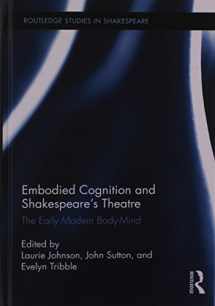
Embodied Cognition and Shakespeare's Theatre: The Early Modern Body-Mind (Routledge Studies in Shakespeare)
Book details
Summary
Description
This collection considers issues that have emerged in Early Modern Studies in the past fifteen years relating to understandings of mind and body in Shakespeare’s world. Informed by The Body in Parts, the essays in this book respond also to the notion of an early modern ‘body-mind’ in which Shakespeare and his contemporaries are understood in terms of bodily parts and cognitive processes. What might the impact of such understandings be on our picture of Shakespeare’s theatre or on our histories of the early modern period, broadly speaking? This book provides a wide range of approaches to this challenge, covering histories of cognition, studies of early modern stage practices, textual studies, and historical phenomenology, as well as new cultural histories by some of the key proponents of this approach at the present time. Because of the breadth of material covered, full weight is given to issues that are hotly debated at the present time within Shakespeare Studies: presentist scholarship is presented alongside more historically-focused studies, for example, and phenomenological studies of material culture are included along with close readings of texts. What the contributors have in common is a refusal to read the work of Shakespeare and his contemporaries either psychologically or materially; instead, these essays address a willingness to study early modern phenomena (like the Elizabethan stage) as manifesting an early modern belief in the embodiment of cognition.


We would LOVE it if you could help us and other readers by reviewing the book
Book review



